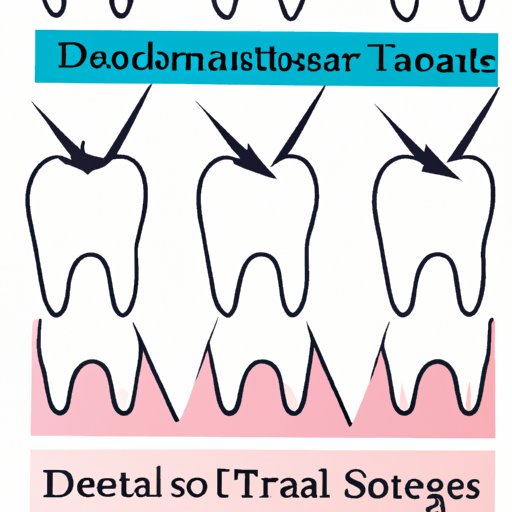Introduction
Stress is a normal part of life, but too much stress can have a negative impact on your physical and mental health, including your oral health. It’s important to understand the relationship between stress and oral health so that you can take steps to reduce the risk of developing dental problems.
To start, let’s define stress and get an overview of its effects on oral health. Stress is defined as a feeling of emotional or physical tension caused by a real or perceived threat. It can range from mild to severe and can be triggered by a variety of life events, such as work, relationships, finances, and more.
When it comes to oral health, research has found that stress can cause a number of issues, including cavities, gum disease, and other dental problems. In addition, people who are under a lot of stress may not take proper care of their teeth and gums, which can lead to further oral health complications.
Examining the Relationship Between Stress and Oral Health
Now let’s take a closer look at the relationship between stress and oral health. First, let’s examine the impact of stress on teeth and gums.
Research has shown that stress can cause teeth grinding, which can lead to tooth enamel erosion and increased sensitivity. Additionally, people who are under a lot of stress may be more likely to clench or grind their teeth, which can lead to jaw pain and even temporomandibular joint (TMJ) disorder.
Stress can also affect your gums. People who are under a lot of stress may be more prone to gum disease due to weakened immunity, poor oral hygiene, and hormonal changes. Furthermore, research has found that people with periodontal disease are more likely to report feeling stressed than those without periodontal disease.
It’s clear that there is a correlation between stress and dental issues, but what is the cause of this relationship? Let’s explore further.

Understanding How Stress Can Lead to Tooth Decay
When it comes to understanding how stress can lead to tooth decay, there are two main factors to consider: the effects of stress on oral hygiene and the link between stress and hormones. Let’s take a closer look at each one.
When people are under a lot of stress, they may be less likely to practice good oral hygiene habits, such as brushing and flossing regularly. Poor oral hygiene can lead to an accumulation of bacteria in the mouth, which can lead to cavities and other dental problems.
In addition to poor oral hygiene, research has found that stress can lead to hormonal changes, which can increase the risk of cavities. When cortisol levels are elevated, it can cause an imbalance in the acidity of saliva, which can lead to tooth decay.
Exploring Ways to Reduce Stress-Related Oral Health Problems
Now that we’ve explored the relationship between stress and oral health, let’s look at some ways to reduce stress-related oral health problems.
The first step is to manage stress levels. Taking time for yourself, getting enough sleep, exercising, and practicing relaxation techniques can all help to reduce stress levels. Additionally, talking to a therapist or counselor can help to identify and address any underlying issues that may be causing stress.
In addition to managing stress levels, it’s important to practice good oral hygiene habits. Brushing twice a day, flossing daily, and using a mouthwash can help to keep bacteria levels low and reduce the risk of cavities and other dental problems.
Finally, it’s important to visit your dentist for regular checkups and cleanings. A dentist can detect and treat any potential problems before they become serious.
Conclusion
It’s clear that stress can have a significant impact on your oral health. There is a strong correlation between stress and dental issues, such as cavities, gum disease, and other problems. Understanding the relationship between stress and oral health can help you take steps to reduce the risk of developing these issues.
Reducing stress levels and practicing good oral hygiene habits can help to reduce the risk of developing oral health problems. Additionally, visiting your dentist regularly for checkups and cleanings can help to detect and treat any potential issues before they become serious.
By understanding the relationship between stress and oral health and taking steps to reduce stress levels and improve oral hygiene, you can ensure that your mouth stays healthy and strong.
(Note: Is this article not meeting your expectations? Do you have knowledge or insights to share? Unlock new opportunities and expand your reach by joining our authors team. Click Registration to join us and share your expertise with our readers.)
